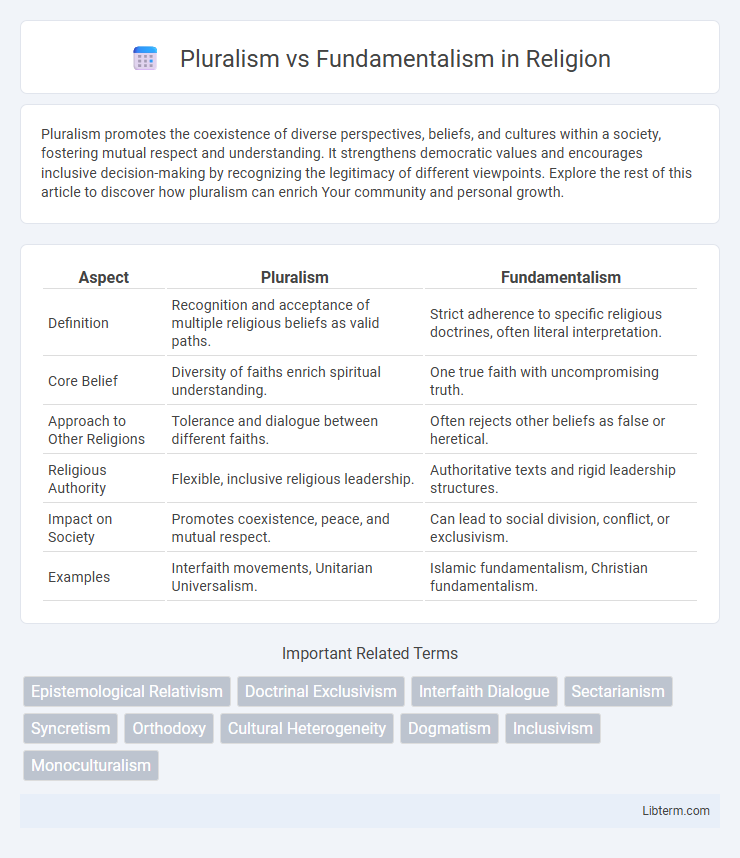Pluralism promotes the coexistence of diverse perspectives, beliefs, and cultures within a society, fostering mutual respect and understanding. It strengthens democratic values and encourages inclusive decision-making by recognizing the legitimacy of different viewpoints. Explore the rest of this article to discover how pluralism can enrich Your community and personal growth.
Table of Comparison
| Aspect | Pluralism | Fundamentalism |
|---|---|---|
| Definition | Recognition and acceptance of multiple religious beliefs as valid paths. | Strict adherence to specific religious doctrines, often literal interpretation. |
| Core Belief | Diversity of faiths enrich spiritual understanding. | One true faith with uncompromising truth. |
| Approach to Other Religions | Tolerance and dialogue between different faiths. | Often rejects other beliefs as false or heretical. |
| Religious Authority | Flexible, inclusive religious leadership. | Authoritative texts and rigid leadership structures. |
| Impact on Society | Promotes coexistence, peace, and mutual respect. | Can lead to social division, conflict, or exclusivism. |
| Examples | Interfaith movements, Unitarian Universalism. | Islamic fundamentalism, Christian fundamentalism. |
Introduction to Pluralism and Fundamentalism
Pluralism emphasizes the coexistence of diverse beliefs and values within a society, promoting tolerance and open dialogue among different cultural, religious, and ideological groups. Fundamentalism advocates strict adherence to specific doctrines or texts, often rejecting alternative viewpoints and emphasizing absolute truths. Understanding the dynamics between pluralism and fundamentalism is essential for addressing conflicts arising from ideological differences in modern multicultural contexts.
Historical Background of Both Concepts
Pluralism emerged as a response to modern social diversity, advocating coexistence of multiple cultural, religious, and ideological perspectives within societies, particularly gaining prominence during the 20th century amid globalization and increased intercultural interactions. Fundamentalism arose in the late 19th and early 20th centuries as a defensive reaction within certain religious communities, especially in Christianity and Islam, emphasizing a strict adherence to perceived foundational doctrines in opposition to modernist interpretations and secular influences. Both concepts reflect divergent historical trajectories: pluralism aligns with democratic inclusivity and multiculturalism, while fundamentalism often aligns with preservation of traditional identity and resistance to change.
Core Principles of Pluralism
Pluralism emphasizes acceptance and coexistence of diverse cultural, religious, and philosophical perspectives, advocating for dialogue and mutual respect among different communities. It promotes the idea that truth can be multifaceted, encouraging inclusivity and understanding rather than exclusivity or dogmatism. The core principles of pluralism include recognizing diversity as a strength, fostering peaceful coexistence, and supporting equal rights and opportunities for all groups within a society.
Defining Characteristics of Fundamentalism
Fundamentalism is defined by a strict adherence to specific theological doctrines, often characterized by a literal interpretation of sacred texts and an uncompromising stance on moral and social issues. It typically emphasizes the perceived inerrancy of scripture, maintaining clear boundaries between believers and non-believers, and resisting modernist influences that challenge traditional beliefs. This worldview fosters a defensive posture aimed at preserving religious identity amidst pluralistic societies.
Pluralism in Modern Societies
Pluralism in modern societies fosters coexistence by promoting diversity in cultural, religious, and ideological perspectives, facilitating inclusive dialogue and mutual respect. It supports democratic values by ensuring minority rights and encouraging multiple viewpoints within legal and social frameworks. This approach strengthens social cohesion and adaptive governance by acknowledging and integrating varied identities and beliefs.
Fundamentalism and Its Social Impact
Fundamentalism promotes strict adherence to specific religious doctrines, often resisting modern interpretations and societal changes, which can lead to social fragmentation and conflict. Its emphasis on absolute truths may contribute to intolerance toward diverse beliefs and cultural expressions, potentially fostering division within pluralistic societies. The social impact of fundamentalism includes heightened polarization, challenges to secular governance, and restrictions on individual freedoms in communities dominated by such ideologies.
Pluralism vs Fundamentalism: Key Differences
Pluralism promotes acceptance and coexistence of diverse religious beliefs, emphasizing dialogue and mutual respect among different faith traditions. Fundamentalism insists on unwavering adherence to specific doctrinal interpretations, often rejecting alternative perspectives and modern societal changes. Key differences include pluralism's openness to religious diversity versus fundamentalism's rigid exclusivity and resistance to compromise.
Challenges and Criticisms of Pluralism
Pluralism faces challenges in balancing diverse belief systems without relativizing core values, leading to criticisms of moral ambiguity and potential cultural dilution. Fundamentalists argue pluralism undermines absolute truths, causing social fragmentation and weakening communal identity. Critics also highlight difficulties in achieving practical coexistence amid conflicting doctrines and power imbalances among groups.
Dangers and Limits of Fundamentalism
Fundamentalism often poses significant dangers by promoting rigid, exclusionary beliefs that can lead to social division, intolerance, and conflict. Its resistance to pluralism limits dialogue and mutual understanding in diverse societies, undermining democratic principles and human rights. The inflexibility inherent in fundamentalist ideologies restricts intellectual growth and fuels extremism, threatening social cohesion and peace.
The Future of Pluralism and Fundamentalism
The future of pluralism hinges on fostering inclusive societies that embrace diverse cultural, religious, and ideological perspectives, promoting dialogue and peaceful coexistence. Fundamentalism, characterized by rigid adherence to specific doctrines, may face increasing challenges as globalization and information exchange expose contradictions and drive the demand for adaptive belief systems. Societal resilience and policy frameworks must balance protecting pluralistic values while addressing the potential rise of fundamentalist movements to ensure social stability and harmony.
Pluralism Infographic

 libterm.com
libterm.com